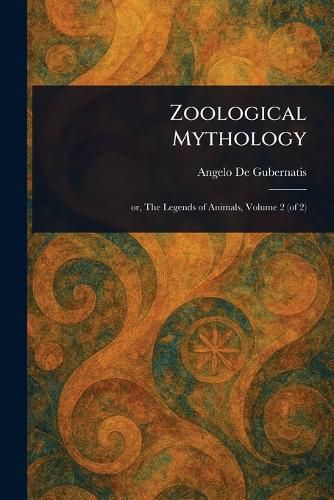Readings Newsletter
Become a Readings Member to make your shopping experience even easier.
Sign in or sign up for free!
You’re not far away from qualifying for FREE standard shipping within Australia
You’ve qualified for FREE standard shipping within Australia
The cart is loading…






This title is printed to order. This book may have been self-published. If so, we cannot guarantee the quality of the content. In the main most books will have gone through the editing process however some may not. We therefore suggest that you be aware of this before ordering this book. If in doubt check either the author or publisher’s details as we are unable to accept any returns unless they are faulty. Please contact us if you have any questions.
Delve into the fascinating world of "Zoological Mythology (Volume II), or The Legends of Animals," by Angelo de Gubernatis. This meticulously prepared republication explores the rich tapestry of animal legends woven into the fabric of folklore and mythology.
Discover the enduring power of mythical animals and their symbolic significance across cultures. De Gubernatis examines a diverse array of creatures, unraveling their connections to ancient beliefs and traditions. This volume offers a valuable exploration of animal legends, providing insights into comparative mythology and the social sciences.
Ideal for those captivated by the intersection of religion, nature, and social science, "Zoological Mythology" offers a journey into the captivating realm of animal myths. A timeless resource for understanding the cultural significance of animals throughout history. Volume II of II.
This work has been selected by scholars as being culturally important, and is part of the knowledge base of civilization as we know it.
This work is in the public domain in the United States of America, and possibly other nations. Within the United States, you may freely copy and distribute this work, as no entity (individual or corporate) has a copyright on the body of the work.
Scholars believe, and we concur, that this work is important enough to be preserved, reproduced, and made generally available to the public. We appreciate your support of the preservation process, and thank you for being an important part of keeping this knowledge alive and relevant.
$9.00 standard shipping within Australia
FREE standard shipping within Australia for orders over $100.00
Express & International shipping calculated at checkout
Stock availability can be subject to change without notice. We recommend calling the shop or contacting our online team to check availability of low stock items. Please see our Shopping Online page for more details.
This title is printed to order. This book may have been self-published. If so, we cannot guarantee the quality of the content. In the main most books will have gone through the editing process however some may not. We therefore suggest that you be aware of this before ordering this book. If in doubt check either the author or publisher’s details as we are unable to accept any returns unless they are faulty. Please contact us if you have any questions.
Delve into the fascinating world of "Zoological Mythology (Volume II), or The Legends of Animals," by Angelo de Gubernatis. This meticulously prepared republication explores the rich tapestry of animal legends woven into the fabric of folklore and mythology.
Discover the enduring power of mythical animals and their symbolic significance across cultures. De Gubernatis examines a diverse array of creatures, unraveling their connections to ancient beliefs and traditions. This volume offers a valuable exploration of animal legends, providing insights into comparative mythology and the social sciences.
Ideal for those captivated by the intersection of religion, nature, and social science, "Zoological Mythology" offers a journey into the captivating realm of animal myths. A timeless resource for understanding the cultural significance of animals throughout history. Volume II of II.
This work has been selected by scholars as being culturally important, and is part of the knowledge base of civilization as we know it.
This work is in the public domain in the United States of America, and possibly other nations. Within the United States, you may freely copy and distribute this work, as no entity (individual or corporate) has a copyright on the body of the work.
Scholars believe, and we concur, that this work is important enough to be preserved, reproduced, and made generally available to the public. We appreciate your support of the preservation process, and thank you for being an important part of keeping this knowledge alive and relevant.